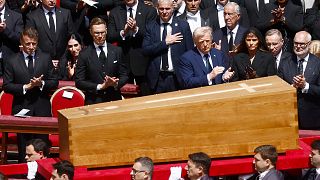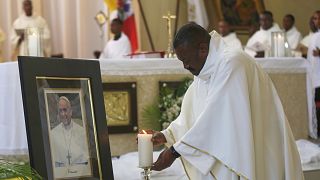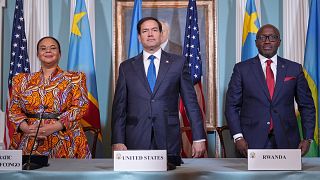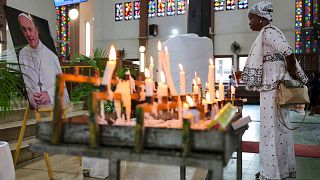Martin Luther King
Sixty years after the Rev. Martin Luther King Jr. led a rally protesting housing discrimination and segregated schools in Boston, thousands of people are expected to gather at the same site to honor and reflect on the historic event. The rally Saturday will take place at the Boston Common near the site of 20-foot-high memorial to racial equity, which shows King embracing his wife, Coretta Scott King, in an embrace.
The original protest rally in 1965 brought the Civil Rights Movement to the northeast, a place King knew well from his time earning a doctorate in theology from Boston University and serving as assistant minister at the city’s Twelfth Baptist Church. It was also the place he met his wife, Coretta Scott King, who earned a degree in music education from the New England Conservatory.
In his speech, King told the crowd that he returned to Boston not condemn the city but to encourage its leaders to do better — at a time when Black leaders were fighting to desegregate the schools and housing and working to improve economic opportunities for Black residents. King also implored Boston to become a leader that other cities like New York and Chicago could follow in conducting “the creative experiments in the abolition of ghettos.”
“It would be demagogic and dishonest for me to say that Boston is a Birmingham, or to equate Massachusetts with Mississippi,” he told the crowd. “But it would be morally irresponsible were I to remain blind to the threat to liberty, the denial of opportunity, and the crippling poverty that we face in some sections of this community.”
The Boston rally happened after the Civil Rights Act of 1964 was won and signed by President Lyndon Johnson, and it was months ahead of the enactment of the Voting Rights Act of 1965 (signed in August). King and other civil rights movement leaders had just come off of the Selma to Montgomery march in Alabama, also referred to as Blood Sunday, weeks before the Boston rally. The civil rights icon was also successful in the 1963 Birmingham campaign that prompted the end of legalized racial segregation in the Alabama city, and eventually around the nation.
This time around, King's eldest son, Martin Luther King III, will be the keynote speaker. He and other speakers are expected to touch on some of the same issues that have plagued communities of color for decades — the need for good jobs, decent health care and affordable housing.
But his visit also comes at a time when the Trump administration is waging war on diversity, equity and inclusion initiatives in government, schools and businesses around in the country, including in Massachusetts.
Since his Jan. 20 inauguration, Trump has banned diversity initiatives across the federal government. The administration has launched investigations of colleges — public and private — that it accuses of discriminating against white and Asian students with race-conscious admissions programs intended to address historic inequities in access for Black students.
The Defense Department, at one point, temporarily removed training videos recognizing the Tuskegee Airmen and an online biography of Jackie Robinson. In February, Trump fired Air Force Gen. CQ Brown Jr., a champion of racial diversity in the military, as chairman of the Joint Chiefs of Staff. Brown, in the wake of Floyd’s killing, had spoken publicly about his experiences as a Black man, and was only the second Black general to serve as chairman.
The administration has fired diversity officers across government, curtailed some agencies’ celebrations of Black History Month, and terminated grants and contracts for projects ranging from planting trees in disadvantaged communities to studying achievement gaps in American schools. Trump also wants to force changes at the Smithsonian Institution with an executive order that targets funding for programs that advance “divisive narratives” and “improper ideology."
The efforts are also impacting Massachusetts, which has pushed back against threats from the Trump administration to cut funding, if the state doesn't comply with an Education Department order to certify local school systems' compliance with a race-neutral interpretation of civil rights laws. The Museum of African American History, in Boston, also announced earlier this month that a $500,000 federal grant it got last year has been terminated.
“Make no mistake, these efforts are designed to marginalize and destabilize the Museum of African American History, and African American public history institutions like us," the museum wrote in statement. “We are all in danger of being erased.”
Martin Luther King III told The Associated Press, said the attacks on diversity make little sense.
“We cannot move forward without understanding what happened in the past,” he said.
“It doesn’t mean that it’s about blaming people. It’s not about collective guilt. It’s about collective responsibility,” he continued. “How do we become better? Well, we appreciate everything that helped us to get to where we are. Diversity hasn't hurt the country.”
King said opponents of diversity have floated an uninformed narrative that unqualified people of color are taking jobs from white people — when the reality is that they have long been denied opportunities they deserve.
“I don’t know if white people understand this, but Black people are tolerant,” he said. “From knee-high to a grasshopper, you have to be five times better than your white colleague. And that’s how we prepare ourselves. So it’s never a matter of unqualified, it’s a matter of being excluded.”












Go to video
World leaders converge on Rome for Pope's funeral
Go to video
Russia's Putin, Trump envoy discuss war in Ukraine
Go to video
South Africa's Ramaphosa holds phone call with Trump, to meet 'soon'
Go to video
Trump says U.S. and China will 'get along great'
Go to video
South Sudan to send delegation to the U.S. in a effort to appease tensions
Go to video
US plans to reduce diplomatic presence could be part of wider change in US-Africa ties